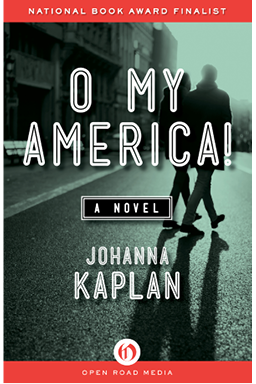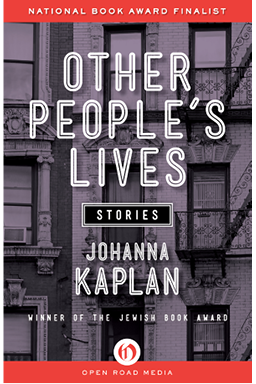Other People's Lives (27 page)

“She told me about her.”
“In Palestine she lived in swamps and in deserts and if she ever earned a penny, she immediately gave it away. What did your mother tell you?”
“That she was stubborn,” said Naomi, and wheeled out the door to a silent, blank hallway.
“Stubborn?” The aunt had to squeeze with her purse past the man on the stretcher. “What she was was not stubborn. Masha was a nut. She never got married, she worked day and night, she lived for her profession and died all alone.”
“Maybe she was good in languages,” Naomi said. “Let me get you Toby's present.”
“Naomi, why can't you bring it to her yourself? She isn't used to living out of town yet. Every time I talk to her I can tell that she's crying.” It was what she could see on the phone: Toby, in whose face people had always seen so much sweetnessâ
cheynâ
sitting on a beige sofa in Connecticut, her face dark and red, simply from crying.
“As long as she doesn't get her medical advice from newspapers,” the stone said, and disappeared with her braid so that there was no point in following her.
Not that there was anywhere to go: the hall was filled up with closed doors and blank spaces. Finally, at the far end of the corridor there was some sunlight which opened itself out from a room marked
LOUNGE.
Here, plants were on the window sill, newspapers lay on the chairs, and a television with nobody anywhere near it just kept on going. People, mostly in bathrobes, sat around doing nothing. A woman in a black nightgown was putting polish on her fingernails, a man who hadn't shaved yet was shuffling a deck of cards, and next to the long window, bobbing back and forth in the sun with their bathrobes, two boys were playing Ping-Pong. The aunt looked around for Mrs. Grossbard, a woman who didn't know yet that her life would mean waking up one morning to say, “Oh my God, I don't even know what day this is,” and found instead that she couldn't stop herself from staring at a very young girl who looked as if she had just stepped out of a cemetery. That she was wearing a pink quilted bathrobe made no differenceâit could not substitute for flesh which she simply did not have. Bones and sockets stood out in her so far that when she stood or walked, her arms and legs looked like marionette strings, and when she began to open her mouth, it did not seem possible that her voiceâwhich was shrillâhad anyplace to come from.
“I gained one pound and I found out what my doctor's first name is,” she said to a boy in bedroom slippers whose hair fell into his guitar. “It says N on her thing, but I asked her and she said it's Naomi.”
“They have to tell you if you ask them,” said the boy, who did not either raise his beard or play his guitar.
“If I gain five pounds, she said that she'll take me to the Coffee Shop, and if I gain ten pounds I'll be able to go off the Sustogen.”
“The Coffee Shop sucks,” the boy said, and began to look out through the room with the small, sour eyes of a definite maniac.
“What would you do if you got stuck in a plane right next to a maniac?” the aunt ran out to ask Naomi, who, it turned out, was sitting inside a glass cage labeled
NURSES' STATION.
On one side of her was S. Sonnenborn of the glowing tie, on the other, a fat, red-faced boy who was eating a Danish. In their white coats, they sat perched on a desk like children at a soda fountain. Naomi's legs dangled, they could not reach the floor.
The aunt knocked on the glass and Naomi came out carrying a large package beautifully wrapped in blue-and-purple paper, perfectly tied with a dark purple bow. Obviously, she had not done it herself: it was
Toby
who wrapped things with fine, perfect fingers,
Toby
who once painted tiny birds on her old bedroom wall, Toby who even now could weave rugs that people offered money for.
“Naomi, do you remember when Toby made you that scrapbook for a present? She got the leather from her Arts and Crafts Club, and she pasted in for you all the old pictures of your family that you didn't even remember?”
Naomi looked as if she were about to say something, but it was only to smile at the unfortunate skeleton-girl, who had crept down the hall in her pink quilted robe.
“Do you sign
death
certificates?” it suddenly occurred to the aunt.
“On Psychiatry? What do you think I do here?”
“I don't mean
here,
I just mean if somebody happened to die, and you were the one who was thereâ”
“And it
happened
to be in the middle of the Belt Parkway, and there
happened
to be an off-duty cabâ
that's
what you're trying to say to me.
That's
the only reason you're here.”
“Naomi!” the aunt said, and felt her face swelling out in a thousand directions, but hanging over the vague and cloudy-eyed stone whom Bluma had named Nechamaâcomfort, solaceâand who was not so vague about languages that she did not know what it meant.
Johanna Kaplan was born in New York City and studied at New York University and Columbia University. Her collection of stories,
Other People's Lives
, was nominated for a National Book Award and the Hemingway/PEN Award, and won the National Jewish Book Award in 1976. Her novel
O My America!
, also nominated for a National Book Award, won the Edward Lewis Wallant Award in 1981. Kaplan's stories have appeared in
Commentary
and
Harper's
. She has received grants for her writing from the New York State Council on the Arts and the National Endowment for the Arts.
All rights reserved, including without limitation the right to reproduce this ebook or any portion thereof in any form or by any means, whether electronic or mechanical, now known or hereinafter invented, without the express written permission of the publisher.
This is a work of fiction. Names, characters, places, events, and incidents either are the product of the author's imagination or are used fictitiously. Any resemblance to actual persons, living or dead, businesses, companies, events, or locales is entirely coincidental.
Copyright © 1975, 2000 by Johanna Kaplan
Cover design by Kelly Parr
978-1-4804-1468-6
This edition published in 2013 by Open Road Integrated Media
345 Hudson Street
New York, NY 10014


Open Road Integrated Media
is a digital publisher and multimedia content company. Open Road creates connections between authors and their audiences by marketing its ebooks through a new proprietary online platform, which uses premium video content and social media.
Videos, Archival Documents,
and
New Releases
Sign up for the Open Road Media newsletter and get news delivered straight to your inbox.
Sign up now at
FIND OUT MORE AT
FOLLOW US:


